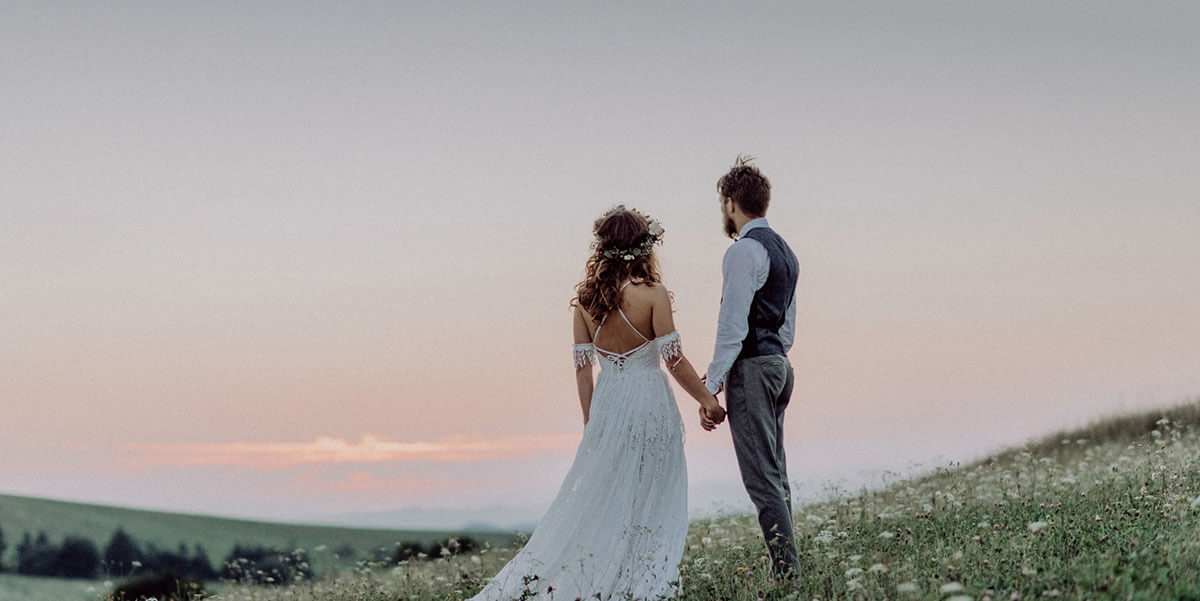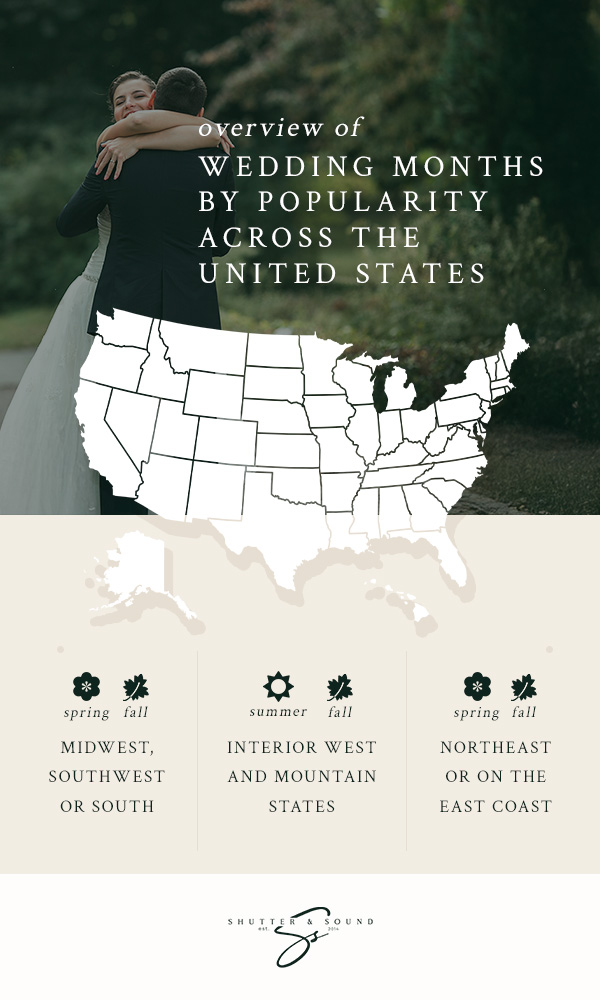


After celebrating your engagement and establishing a budget baseline for your big day, it’s time to get into the nitty-gritty details. Planning your wedding begins with deciding when to say your vows. Depending on where you live, the seasons you love and the details you’ve decided are essential for your wedding day, you’ll find some parts of the year to be more fitting than others.
But when is peak wedding season, and how do you choose among the most popular months? Do you envision relaying your vows with a snowy backdrop, or do you picture your photos highlighting lush greenery and vibrant flowers? Here, we’ll guide you through everything you need to know about wedding season across the country. We’ll give you details about the most and least popular wedding months and the pros and cons of picking either one or something in between.
Peak wedding season refers to the time of year that is most popular for these celebrations. Generally, most people consider peak wedding season to fall between June and September. However, some areas face more drastic summers or winters, causing variations in specific peak wedding seasons across the country. Additionally, many hot-spot wedding destinations like Hawaii or California have specific peak seasons that reflect popular times to get married in the area and off-seasons when weddings or travel are less common.

Wedding season varies across the United States. The changing seasons and local offerings of common wedding items like flowers impact the wedding season. Whether you’re getting married in your hometown or planning a destination wedding across the country, it’s helpful to recognize these peak times. Here’s an overview of wedding season by region:
Peak season for eastern states falls in the late spring and early fall months. For most eastern states, these times of the year offer the most mild weather and gorgeous natural backgrounds. Summers can be very hot, while winters can be frigid, and predicting the weather becomes a lot less certain during either of these seasons.
Comfort is a driving factor for wedding season in these areas. Spring and fall offer a welcome reprieve from the sweltering heat you’ll typically face in the months of July and August. However, you might find some specific locations or venues with variations. For example, lakefront locations in Midwest states are pretty popular in the summer because the cool breezes from the water, paired with beautiful scenery, make summer weddings much more desirable. In the Southwest, you can find peak wedding season closer to the winter. These states have much more mild winter temperatures and offer many sunny days, especially in coastal areas such as Florida.
Couples looking for an eye-catching backdrop in the mountains can look for peak season offerings in the summer. This time of year will offer comfortable temperatures, and there will be plenty of local events and activities for guests to enjoy outside of your big day. The fall is another excellent time for interior west and mountain state weddings. The temperatures will be cooler, but the stunning backdrop of changing leaves and bright colors makes these areas a hot spot. The spring is much less popular in these areas because of melting snow and temperature fluctuations that can make wedding planning a little trickier.

The most popular month can vary by year. In 2023, the busiest month for weddings was a tie between September and October, accounting for 34% of all weddings. June was a close follow to the most popular, making up 11% of weddings, which was an increase from 10% in 2022. Of course, if you’re looking at specific regions, the most popular month can vary.
While every location offers unique advantages at various points throughout the year, you’ll find several common benefits to hosting your wedding during the peak season, regardless of specific location. Benefits of choosing a popular wedding month include:
Despite the many benefits of choosing a popular wedding month, there can be some drawbacks. Here’s what you should keep in mind when considering peak wedding season:
Off-peak season refers to the time of year when weddings aren’t as common. Just like peak season, this can vary by region. It’s worth researching the off-season for your desired location to anticipate prices and availability for local vendors. Generally, the off-peak season falls between December and February. These months tend to have the fewest wedding events, regardless of specific location.
A recent study found the cheapest months for a wedding to be either January or February. With fewer weddings happening around these times, many wedding-related expenses are lower, bringing the overall cost down significantly. However, one thing to keep in mind is that February may have some price spikes throughout the month. Valentine’s Day may cause prices on elements like hotel rooms and floral arrangements to increase in cost as couples all over the country find ways to show appreciation for their significant other. If you have your heart set on a February wedding, consider the very beginning or end of the month to avoid Valentine’s Day challenges.
December, January and February are the least popular wedding months. These months are often the coldest throughout the United States, with many states facing rainy or snowy weather during the winter season. Unpredictable weather may be a significant cause of the lack of popularity. Additionally, January and December are often busier in other ways, having significant holidays that bring families together. Family traditions, commitments and similar factors could sway people from these challenging months.
Don’t be discouraged by the off-peak season when planning your wedding. Although you may be drawn to the popular months and weather, there are tons of advantages to taking the road less traveled. Check out the benefits of opting for the off-season:
Just like the peak season, the off-season also has unique disadvantages to consider. Keep these factors in mind:
Ultimately, there’s no right or wrong time to host your special day. No matter when you say “I do,” there are plenty of ways to heighten the magic. At Shutter and Sound, you can find talented wedding videographers ready to capture your most precious moments, no matter the time or year. Contact us for pricing and availability for your big day. We can’t wait to celebrate with you!